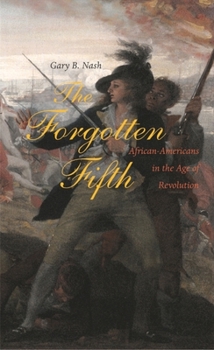The Forgotten Fifth: African Americans in the Age of Revolution
(Part of the The Nathan I. Huggins Lectures Series)
Select Format
Select Condition 
Book Overview
As the United States gained independence, a full fifth of the country's population was African American. The experiences of these men and women have been largely ignored in the accounts of the colonies' glorious quest for freedom. In this compact volume, Gary B. Nash reorients our understanding of early America, and reveals the perilous choices of the founding fathers that shaped the nation's future. Nash tells of revolutionary fervor arousing...
Format:Hardcover
Language:English
ISBN:0674021932
ISBN13:9780674021938
Release Date:February 2006
Publisher:Harvard University Press
Length:256 Pages
Weight:0.69 lbs.
Dimensions:1.0" x 4.8" x 7.4"
Customer Reviews
3 ratings
Great book
Published by Thriftbooks.com User , 16 years ago
This is an excellent book to be used in a history class I'm taking. Normally I'm not too sure about books I'm asked to get for classes such as this, but it turned out to be an excellent read. I would recommend it to anyone.
"The Black Founding Fathers and Mothers of the Revolutionary Age": An Essential History
Published by Thriftbooks.com User , 18 years ago
Gary Nash's _The Forgotten Fifth: African Americans in the Age of Revolution_ is an excellent introduction to early U.S. history, particularly the Revolutionary Period, from an African American perspective. What becomes clear from his study is that American history and the story of the nation's founders cannot be understood without a thorough examination of the lives and contributions of African Americans. Much of the groundwork for these lectures is contained in Nash's 1991 work, _Race and Revolution_, which is an excellent companion to this work because it excerpts the writings and petitions of the black founding fathers: people like Richard Allen, Benjamin Banneker, Prince Hall, and James Forten. Nash reminds readers of an important fact: African Americans were actively involved in the debates of the Revolutionary Period and in the military action as well, fighting on both the American and the British side. In terms of the military involvement, white and black soldiers fought side-by-side in integrated units in the Revolutionary War, a phenonemon which would not re-occur until the Korean War, nearly two hundred years later. The first chapter "The Black Americans' Revolution" discusses African Americans' participation in the Revolutionary War, a subject that is generally not widely known in the United States. Nash describes the large flight of slaves and freemen to the British-side who offered emancipation in 1775 through Lord Dunmore's Emancipation Proclamation. In contrast, the American forces offered freedom in exchange for one year of military service. For the colonials, wide-spread emancipation was never offered despite the enlightenment rhetoric expressed in the Declaration of Independence and in state constitutions. Nash begins chapter one by crediting previous historians and, in particular, William C. Nell, whose _Colored Patriots of the American Revolution_ (1855) was the first historical account of black soldiers fighting for the Americans. Nash discusses how Nell, a black school teacher in Boston, focused exclusively on black patriots, de-emphasizing black participation on the British side. The emphasis of Nell's history advanced a political argument for black citizenship and rights in the 1850s, during a period when rights were being retracted in the North. Chapter two "Could Slavery Have Been Abolished?" looks closely at the contradiction between the Declaration of Independence, with its statements about unalienable rights, and the Constitution, which inscribed legal slavery. Nash makes a convincing case that there was an opportunity for abolition at the beginning of the Republic, which was later sacrificed to short term political interests reflecting the North and Mid-Atlantic states' lack of conviction. Nash criticizes the trend among professional U.S. historians to apologize for the founding fathers' inaction on abolition--the view that historical circumstances did not permit abolition at this time. Na
Brilliant
Published by Thriftbooks.com User , 18 years ago
Gary Nash has done it again. He ponders whether abolition following the Revolutionary War would have been possible. He provides the most detailed argument to date as to how and why it could of happened. I, being a historian myself, had previously accepted the opposition side and thought abolition would not of been possible following the revolutionary war due to states rights and the loose union established by the thirteen colonies during the war for independence, but Nash brings up some interesting points as to why this train of thought is an inaccurate portrayal of the times. The book also discusses some of the black leaders following the revolution and their attempts to gain an equal footing for blacks within the new republic. The political struggle of blacks during this period of American History is often untold, and Nash does an outstanding job of summing up what occurred in such a short and easy read that will leave you wanting more. I wholeheartedly reccomend this book to those who wish to explore a forgotten part of our history. For further reading on the subject I would reccomend "Washington's Decision," "Water from the Rock," and "The Negro in the American Revolution."





